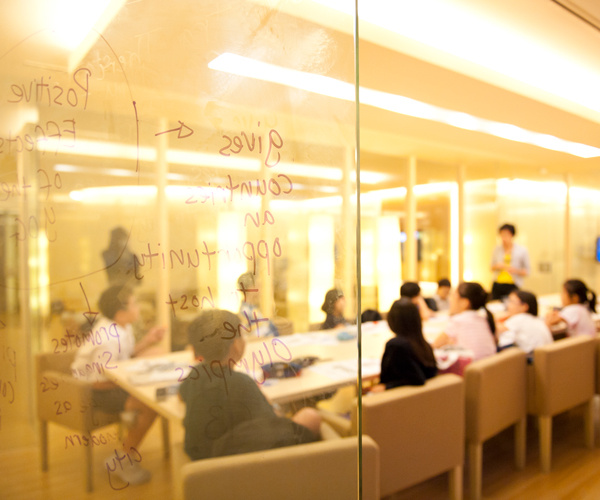
The transition from primary school to secondary school can be stressful for parents and children alike, as the familiar environment of the past six years is replaced by something completely new. Understanding what your child is facing can go a long way in smoothing this process.
The following are five key aspects of the initial phases of the secondary school journey you should look out for and stay on top of as your child comes of age and begins to navigate their new academic life.

1. A New Social Learning Environment
Your child is in a classroom where, to them, everything is in flux and uncertain.
Many of their primary school friends might be in different classes or schools, and at this juncture, they may still be trying to get to know their new classmates and make new friends.
They may also worry about the expectations of their new teachers.
It is important for your child to adapt and become comfortable in their new environment quickly, as this has been shown to have a positive impact on learning and grades. Conversely, being stressed about failing to ‘fit in’ and not having any friends can have the opposite effect.
You can support your child during this period by checking in with them regularly on how they find their new class, subjects and classmates. The way your child communicates with you could change drastically as they enter adolescence, and you will want to be mindful of this as you get them to open up about their school day.

2. Increased Freedom and Responsibilities
More freedom for your child throughout the school day is part and parcel of being in secondary school.
They may now be commuting to school and back on their own, have an added lunch break on top of recess time at their disposal, and increased co-curricular activity (CCA) commitments to attend to.
At the same time, they will also be expected to be more independent when completing their schoolwork and when managing research projects.
As parents, you can help by setting clear boundaries or expectations for your child even as they enjoy their newfound freedom as teenagers.
These do not have to be too restrictive or rigid, and can include setting a time for them to be back home, a limit on phone time, coming up with a system for them to keep track of their assignments on their own, and devising a personal timetable for homework, self-study and revision.
You should also trust the school and your child’s school and enrichment teachers to have their best interests at heart, so work with them instead of against them.

3. More Varied Lessons
On top of topics of higher complexity being introduced in the English, Maths, Science and Mother Tongue, in secondary school, your child will also come across new subjects such as History, Design & Technology, Food & Nutrition, Geography, Literature, History, and various new ways of learning in the classroom.
For example, they might be expected to conduct simple experiments in lab sessions or put together a presentation for the entire class while working in a group.
As parents, it is also important for you to be familiar with changes in how your child will be assessed. For example, there are no longer any mid-year exams for Secondary 1 students, a measure implemented by the Ministry of Education with the precise purpose of smoothing the transition from primary to secondary school.
However, the lack of the mid-year exams means that it can be difficult for you to track your child’s progress at the halfway mark in Secondary 1. How can you then identify and target your child’s areas of weakness and gain traction in improvement for each subject by the time the final year exams roll around?
At The Learning Lab, we offer three programmes in English, Mathematics and Science respectively that will help equip your Secondary 1 child with the necessary skills to tackle these changes with ease, and systematically track their progress through targeted practices, quizzes and hands-on activities.
You can check out an overview of the programmes here, or download our Secondary 1 programme brochure for more details.

4. Increased Learning Pressure
More subjects to handle naturally involve more hours spent in school and an increased workload for your child, which they may struggle to adapt to at first. As they attempt to manage the increased pressure, they may end up falling behind for their weaker subjects in particular.
Communicating with your child is critical in this early stage of secondary school, as you can help with time management, identify the areas they are struggling in and also provide much-needed emotional support.
Your child may also be staying up late to revise for tests or to complete an assignment as the deadlines pile up. This is a good time to remind them of the importance of good lifestyle habits.
Getting enough sleep, having a good diet and regular exercise go a long way towards having more energy and being able to focus better in class.
A Different, Secondary School Approach to Parenting
Secondary school calls for adjustments to be made on the parts of both children and their parents.
While you may be tempted to hover protectively behind your child with the changes coming thick and fast, it is important to remember that they are only now just starting out on the path that prepares them for adult life.

Equipping your child with the necessary tools they need to succeed includes giving them the elbow room to try things out for themselves and come out stronger from prevailing against challenges.
It might also be helpful to keep in mind that this is a journey that has been successfully completed by millions of teenagers before, including you.
Despite the numerous hurdles, you emerged victorious in your own secondary school journey, and got to where you are now from learning how to overcome obstacles in your adolescence.
Even though the secondary school curriculum and practices of today starkly differs from your own experiences of a bygone age, one thing is constant: the transition from primary school to secondary school is a highly stressful experience and can be overwhelming especially when the challenges are not addressed in its incipient stages.
Have a sit-down session with your teenager and talk about any challenges they have encountered or may come across as they move forward in Secondary 1. From there, you can identify the areas of support they require and source for strategies tailored to their unique needs.
A Multi-Faceted Support System
At The Learning Lab, we believe in helping you and your child assimilate comfortably into the new routines and expectations of secondary school life through a multi-faceted support system that uplifts your child’s academic and personal growth in these vital teenage years.
As educators, this means not only imparting the requisite skills to your child but also the right mindset and attitude to approach any challenges that life puts in their way. We would love to be a part of your child's secondary school journey. Click here to find out more about our all-encompassing plan to see your child through the four years of secondary school.
The Learning Lab is now at locations. Find a location that suits your needs.
If you have any questions about our range of programmes or class schedules, you may contact us at 6733 8711 or drop us an email at enquiry@thelearninglab.com.sg.


